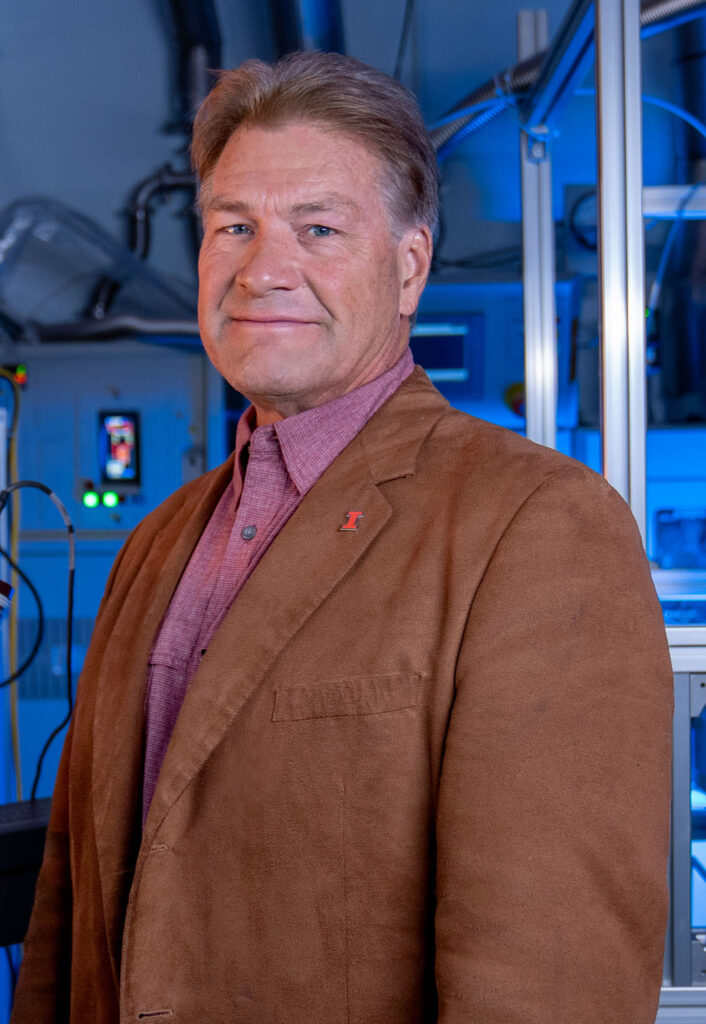Michigan Plasma prize honors University of Illinois professor

He has honed the power of plasma to advance semiconductor processing, high-quality thin films for magnetic hard drives, and fusion energy. For these and other accomplishments, University of Illinois at Urbana-Champaign Professor David Neil Ruzic has been chosen to receive the 2024 University of Michigan Prize for Excellence in Plasma Science and Engineering.
Ruzic is the Abel Bliss Professor of Engineering in the Department of Nuclear, Plasma and Radiological Engineering at UIUC.
The annual international prize, established by the Michigan Institute for Plasma Science and Engineering (MIPSE) and Michigan Engineering in 2023, honors a researcher, educator or manager for advances in plasma science and engineering that have or will significantly benefit society.
“With his rare mix of talents as a fundamental plasma scientist, remarkable educator and innovative entrepreneur, David has translated discoveries in basic plasma science into marketable solutions to improve microelectronics fabrication and advance clean fusion energy. In his work, which focuses on how plasma interacts with materials, he has bridged research and applications and provided societal benefit,” said selection committee chair Thomas Mehlhorn, retired former superintendent of the Naval Research Laboratory’s Plasma Physics Division, adjunct professor at the University of Michigan and MIPSE member.
Plasmas—ionized gasses that make up most of the ordinary matter in the universe—have long been of interest to scientists and engineers due to their unique properties. They can conduct electricity, respond to magnetic fields, and produce chemically reactive environments at low temperatures. Today they’re used in medicine, manufacturing, microelectronics, sustainable technologies and space exploration, for example. Recent advances in fusion energy—the clean, sustainable process that powers the stars—have raised the profile of plasma science and engineering.
Ruzic is honored “for contributions to the investigation of plasma-material interactions having significant impact on the fields of EUV (extreme ultraviolet) lithography, thin films manufacturing, and magnetic fusion,” according to the award citation.
His work in extreme ultraviolet lithography—a cutting-edge semiconductor manufacturing technique—has been critical to bringing it to market to enable higher chip performance and efficiency. The approach, which relies on 13.5-nanometer wavelength light to create finer features and greater transistor density than previously possible, is now used by leading fabrication firms such as TSMC, Samsung and Intel. Ruzic’s contributions include developing EUV plasma sources and advancing techniques to keep the optics and lithography sources clean and free from contaminants throughout the manufacturing process, reducing costs and improving reliability.
In the field of thin films manufacturing, which is integral to nearly every step of semiconductor manufacturing, Ruzic optimized a technique known as plasma magnetron sputtering, enhancing the yield and uniformity of the films it produces. A startup he co-founded with postdoctoral researchers, Starfire Industries, translated the approach to commercial products. Today it’s the leading method for making high-quality thin films for magnetic memory devices such as commercial hard drives.
With regard to fusion energy, Ruzic developed an innovative way to use liquid lithium coatings on reactor walls to address a host of major obstacles in magnetic confinement fusion, one of two approaches vying to make fusion energy a reality. He demonstrated how a layer of flowing molten lithium could help hold temperatures down inside the reactor, protect the equipment and keep the plasma pure and stable. The work could pave the way for fusion power plants that are smaller and less expensive than other approaches could enable.
“Being chosen by my peers for this award is tremendous validation,” Ruzic said. “I work across multiple plasma fields: fusion, magnetron sputtering, etching, EUV sources, and atmospheric-pressure plasmas. I had always worried that not specializing more deeply would dilute my impact. On the other hand, the cross-fertilization between those areas has allowed me to find connections and innovations that others may have missed. Awards like this make me feel much better about the path I chose.”
Ruzic has been at UIUC since 1984 after receiving his PhD in physics from Princeton University and conducting postdoctoral work at the Princeton Plasma Physics Laboratory. He is a fellow of the American Nuclear Society, American Vacuum Society, American Physical Society, and the International Society for Optics and Photonics (SPIE). He has published over 230 refereed journal papers, two books, and six book chapters and holds 11 patents. He has advised 37 PhD students and 61 thesis master’s students. In 2020, he founded the Illinois Plasma Institute located in the UIUC Research Park, which is funded by industry to perform translational work and started a Masters in Plasma Engineering degree program which is closely coupled to industry. He is known on YouTube as Illinois EnergyProf with 83,000 subscribers and over 8.5 million views.
The Michigan Institute for Plasma Science and Engineering (MIPSE), sponsored by the University of Michigan, brings together plasma researchers from Michigan universities and the international community to investigate these fundamental plasma phenomena and translate advances in plasma science into society benefiting technologies.
 MENU
MENU 
